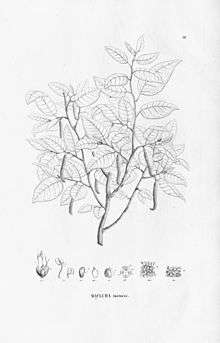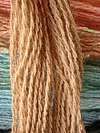Maclura tinctoria
Maclura tinctoria, known as old fustic and dyer's mulberry,[3] is a medium to large tree of the Neotropics, from Mexico to Argentina. It produces a yellow dye called fustic primarily known for coloring khaki fabric for U.S. military apparel during World War I. This dye contains the flavonoid morin.[4]
| Maclura tinctoria | |
|---|---|
 | |
| Scientific classification | |
| Kingdom: | Plantae |
| Clade: | Tracheophytes |
| Clade: | Angiosperms |
| Clade: | Eudicots |
| Clade: | Rosids |
| Order: | Rosales |
| Family: | Moraceae |
| Genus: | Maclura |
| Species: | M. tinctoria |
| Binomial name | |
| Maclura tinctoria | |
| Synonyms[2] | |
| |
The leaves can be used to feed silk worms.[5]
Old fustic is not to be confused with young fustic (Rhus cotinus) from southern Europe and Asia, which provides a more fugitive colour.
Dyeing
Fustic is a bright yellow dye that is very color-fast when used with mordants. It is frequently combined with other dyestuffs and various mordants to produce a range of yellow and greenish colors:[3]
- With woad or indigo: bright or Saxon greens
- With bichromate of potash: old gold
- With logwood and bichromate of potash: greenish yellows
- With copper sulfate: olive greens
- With ferrous sulfate: dark greens
gollark: I did.
gollark: But *not* the Warp server.
gollark: It works with `python3 -m http.server`.
gollark: I'm using the *same file*, served by `python3 -m http.server` and Warp's static file handling.
gollark: Okay, this is incredibly weird! Even when my server sends `audio/mp4` instead of `audio/m4a` in the headers, *Firefox still won't play it*!
References
- Rivers, M.C.; Barstow, M. & Mark, J. (2017). "Maclura tinctoria". IUCN Red List of Threatened Species. 2017: e.T61886731A61886745. Retrieved 11 August 2020.
- "Maclura tinctoria". Germplasm Resources Information Network (GRIN). Agricultural Research Service (ARS), United States Department of Agriculture (USDA). Retrieved 17 December 2017.
- Goodwin, Jill (1982). A Dyer's Manual. London: Pelham Books Ltd. p. 60. ISBN 0-7207-1327-7.
- "Morus tinctoria". Retrieved 20 February 2010.
- Mabberley, D.J. (1997). The plant book: A portable dictionary of the vascular plants. Cambridge: Cambridge University Press.
This article is issued from Wikipedia. The text is licensed under Creative Commons - Attribution - Sharealike. Additional terms may apply for the media files.

